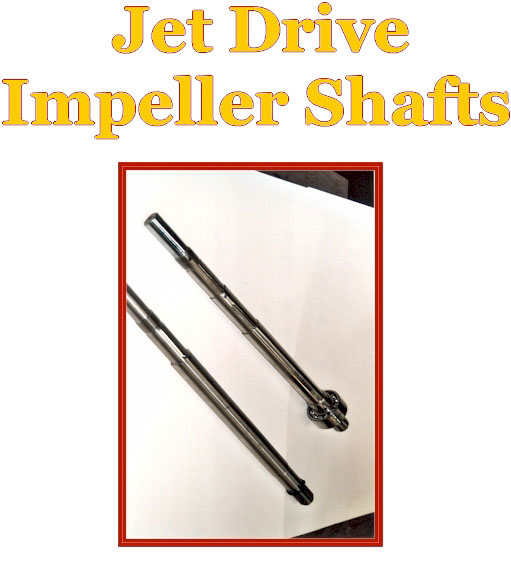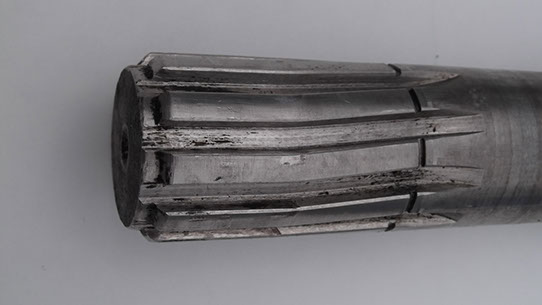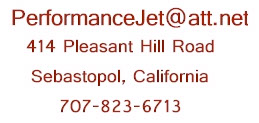

Impeller shafts are not all created equal. In the 1970's 80's and 90's , jet drive manufacturers offered a variety of Impeller shafts. The basic shaft was usually made from 304 or 306 stainless steel. This shaft was a good piece but it was not designed to hold up to punishing , high horse power applications.
Berkeley came up with a shaft for the high performance applications and trade named it the AquaMet shaft.
These shafts are stronger shafts with a higher carbon content in the alloy mix. To this day I have never been able to pin down the actual alloy combination but, I have it from a good source, that these shafts are in the 400 series of stainless steel.
Legend Jet drive also offered these high performance shafts as an upgrade to their jets.
Some manufacturers experimented with high carbon content 316 and 317 stainless shafts as their high performance shaft. These were also very strong shafts.
In the last few years most of the manufacturers have dropped the 304 and 306 shafts and started using the AQ or 17-4 PH shafts exclusively for all of their jet drives.
In the world of Jet Drives today, you have two high performance choices, the AquaMet or the 17-4 PH shaft.
These two shafts are not the same, as some people out there may claim..
The 17-4 shaft technology came from the V drive world and was used for propeller shafts. These shafts are made with K Monel in their alloy mix.
This combination allows the shaft to flex under high shock loading conditions making for a much stronger shaft.
Some years ago now, American Turbine, offered these shafts exclusively in their jet drives. Aggressor Jet drive also uses only 17-4 shafts.
Berkeley Jet drive offers the standard shaft on their jets with the AQ shaft offered as their high performance option.
I am probably going to get into trouble here with some folks, but, in my opinion, the 17-4 is the better of the two choices. The AQ is a good shaft but I would not choose this shaft in applications beyond 1000 HP.
In any application beyond 1000 HP or in high stress racing applications the 17-4 PH shaft is the only way to go.
I have heard from some builders that the AQ shaft is too rigid and has cracked in the spline area in some punishing , high load applications. Personally, I have not had any problems with the AQ shaft. But, I have also noted with some AQ shafts, that the bar stock can be out of round. The thrust bearing , impeller and tail bearing shoulders are on the money in relation to the shaft centerline but the OD of the rest of the shaft is not. I have seen them out of round .008 to .010 of an inch or more.
I guess that this depends on how each manufacturer machines their shafts.
I have talked to Dave at Aggressor Jet Drive, years ago, and he told me that they re-cut their shafts on the same centerline that the rest of the shaft is cut on to produce a straight OD from one end to the other. I am sure American Turbine does the same as well. I checked one of Aggressors shafts, I had in stock, and it was dead on from one end to the other.
Performance Jet offers both of these shafts in a standard version or one cut for a pre-loader impeller (Inducer).
Standard Berkeley Impeller Shafts $359
New in 2017: Hardin Impeller Shafts 17-4 PH Standard Shafts $330
Inducer Cut Shafts $370
PDC 17-4 PH Impeller Shafts Standard: $449
Inducer Cut 17-4 shafts $499
A/T Dominator 17-4 PH shafts $575 standard
NOTE: I have noticed that there have been some impeller shafts put out on the market lately that are cut undersized. The standard impeller shaft diameter shoulld have an O.D. of 1.5". In some cases I have noted shafts cut undersized as much as 0.055"; this is way too much. WIth these undercut shafts, the sleeve and inducer/impeller steps are too shallow in my opinion. Also, if you intend to use a mechanical seal on your shaft instead of the packing rings, the mechanical seal will leak. I can live with a shaft that is undercut 0.010"; that's fine. Just be aware of what you are buying.
-Jim
Performance Jet also sells re-worked, used impeller shafts, when available.
These shafts are standard shafts that have been checked for straightness, have the packing grooves removed when needed and the shaft is cut for a heavy duty thrust bearing retainer. Just be aware that these standard shafts can be twisted. The picture below is a shaft out of a stock jet drive powered by a relatively stock motor. Grabbing air and unloading your jet at high speed and power can be damaging.
PRICE $149



